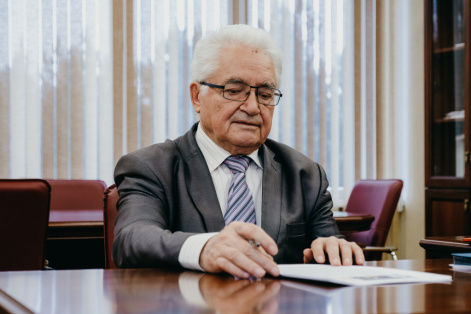Science is an open door to the unknown
2 March 2021 г. FRC KSC SB RAS

- What do these dates imply? Anniversaries are our scientific schools. Let's consider the Minusinskoye experimental and production farm, which is 110 years old this year. Can you imagine how long ago it was decided to develop gardening here in Siberia? Moreover, EPF "Mikhailovskoye" in Uzhursky district deals with seeds of grain crops. We have seedlings, we have zoned seeds of a wide variety of crops that are best suited for local conditions. It is the result and legacy of many years of scientific research in agriculture.
Or can have a look at our Research Institute of Medical Problems of the North. Every year they are given the assignment for residency training for 50 graduates. These specialists are waited for in all the northern regions of Russia.
And here the advantage of a united scientific center is manifested: we can provide doctors with the most advanced methods, for example, bioluminescence testing. Our biologists and physicists train physicians to work with the latest devices, including our own developments.
About 15 years ago, we started joint research with the Institute of Nuclear Physics (Novosibirsk). They have interesting results in the area of irradiation of different power. We needed a very wide range, from powerful to ultra-small one in order to test our high sensitivity receivers. Together, we made a device which operated for 15 years in the hospital of our district, Akademgorodok. The radiation dose received by patients was lower than the background dose in Krasnoyarsk.
Now, in connection with the COVID-19 pandemic, doctors have an urgent need to quickly obtain accurate data from patients. In addition, it must be borne in mind that computed tomography has a rather severe radiation and can be done only twice a year, otherwise it will seriously harm the human organism.
At present, we are to find out how to make the device cheaper. We would also like it to have high sensitivity (superior in accuracy than CT) and to provide a three-dimensional image. When we launch this device into production, it will be a huge joint contribution to science and healthcare.
- Vasily Filippovich, now you are the scientific supervisor or scientific leader of KSC SB RAS. And what is more difficult - to be a scientist or to lead scientists?
- It is almost impossible to be the head of a scientific organization and not be a scientist.
- Because scientists will not accept such a leader?
- No, not because of that. A scientist is not only a specialist in his own subject matter, but he has experience and knows how science is done. Such a leader has an understanding of how to help a person, because he himself knows how the scientific result is obtained.
Unfortunately, nowadays the desire to separate professional knowledge and experience in some area and pure management has become a common practice. In some industries this is justified. As for science, everything is complicated here. This is a search for something new. Here, important and necessary research does not always lead to the desired result, sometimes it simply becomes the knowledge that "something is wrong or not necessary" for the next researchers. In science, a negative result is also a result, it will be useful to someone in future. This is not always the case for other spheres.
As for science, everything is complicated here. This is a search for something new.
Important and necessary research does not always lead to the desired result. But in science, a negative result is also a result, as it will further be useful to someone.
It was easier to be engaged in science itself and at the same time to be the head of a scientific structure in Soviet times, when administrative functions were a “fine-tuned” system, it was clear who is responsible for one or another aspect in the Siberian Branch of the Russian Academy of Sciences and even beyond it. Previously, I knew certain people in certain structures in the SB RAS in Novosibirsk, and I addressed to them if it was necessary to repair a network or build a house. And then, the system was already working without my direct participation.
It is different now. It is necessary to justify the allocation of funding for one or another amount, to announce a competition for works and so on. Moreover, the system is absolutely not optimal: the cheaper proposal wins, which means cheaper materials, cheaper performers and, as a result, worse quality. Other problems can also arise, for example, the competition was held incorrectly, and its results will be challenged, which leads to a significant delay in the task fulfillment. With the growth of the volume of such economic tasks, responsibility and uncertainty, the functions of the administrative and scientific leader become more and more separated, and it is almost impossible to combine them in one person.
Share:
